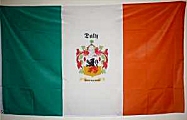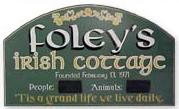KEEP THIS NEWSLETTER ALIVE! Visit https://www.irishnation.com

===========
IN THIS ISSUE
===========
=== News Snaps from Ireland
=== New free resources at the site
=== The Road to Knowledge by John B. McCabe
=== Nine Famous Irishmen by Roger Judge
=== Golfing in Ireland by Sean Downes
=== From an Irish Market Town by Joe Rogers
=== Grace O'Malley - Gaelic Warrior Princess
=== Gaelic Phrases of the Month
=== Monthly free competition result
==========
FOREWORD
==========
Many thanks again to our contributors to this
months edition. Got an article, poem or story?
DO SEND IT IN!
If you have a website or facebook page or blog
(or whatever!) then you can help us out by
putting a link on it to our website:
www.ireland-information.com
Do tell your friends about us as this helps
to keep this newsletter free!
Michael
KEEP THIS NEWSLETTER ALIVE!

Get Your Family Crest Shield at:
https://www.irishnation.com
WE NEED YOUR HELP!
PLEASE - send this newsletter on to your friends
or relatives who you think are interested in
Ireland. By doing this you are helping to keep
us 'free'.
Got something to say? Don't keep it to yourself!
Why don't you submit an article for inclusion
in the next edition? Go here for more information:
https://www.ireland-information.com/newsletter.htm
Do you have access to a website? You can help to
keep this newsletter alive by adding a link to
any of our websites below:
https://www.irishnation.com
http://www.irishsurnames.com
https://www.ireland-information.com
http://www.allfamilycrests.com
http://www.irishpenpals.com
If you have an AOL or HOTMAIL account then you
may get better results by viewing this
newsletter online here:
https://www.ireland-information.com/jun11.htm
The only way that you could have been
subscribed to this newsletter is by filling
out a subscription form at the site whereupon
a confirmation notice would have been issued.
If you wish to unsubscribe then go here:
https://www.ireland-information.com/newsletter.htm
========================
NEWS SNAPS FROM IRELAND
========================
NO RESPITE FROM ECONOMIC TURMOIL
There is still no end in sight to the debt crisis
in Ireland and Europe. Irish attempts to have the
interest rate lowered on the loans the country
continues to receive from the IMF and ECB have been
sidelined by the deteriorating situation in
Greece. While that Mediterranean country teeters
on the brink of a national default the Irish
situation pales into insignificance by comparison.
Should the Greeks default on their loan repayments
(which seems likely) then there is a real
possibility of further market upheaval and
instability in the Eurozone. Experts are suggesting
that there is only a 1 in 5 chance of any country
actually leaving the euro currency, with others
suggesting that if one country does leave then the
entire currency will disintegrate with individual
countries reverting to their own money. Speculation
is rife among economists about exactly how such a
scenario would play out and the answer is perfectly
clear: no-one knows! There are just too many
variables and too many 'what-ifs' to make any
reasoned prediction on this matter.

Assuming that the euro currency does survive (even
if the Greeks do default) then the focus will
return to the interest rates being paid by Ireland
as well as the thorny issue of 'marking-down' the
loans owed to 'senior' bondholders. These senior
bondholders are effectively backed by the German
and French governments within the EU, as the bonds
are to a large degree owned by French and German
banks. It is easy to see why Merkel and Sarkozy
want to insist that Ireland repays the senior
bondholders in return for further loans. The
Eurozone is becoming 'every man for himself' in
a high stakes game of 'Russian roulette'.
Within Ireland the austerity measures continue
unabated. The new government, led by Taoiseach
Enda Kenny, has promised not to increase income
tax but is set to unleash a whole new wave of
other taxes including a property tax and a
water-usage tax. The real issue that must be
tackled though is the issue of public sector pay.
Ireland has one of the best-paid civil and public
services in the world! This tiny country is paying
ridiculous amounts of money to senior and medium
level managers and executives. Public sector pay
is therefore very much in the firing line and
represents an area where there are huge potential
savings for the government.

The Irish economy looks to have bottomed out in
terms of job losses and recession. The economy
returned to statistical growth in 2010 and growth
of 1.3% in the first quarter of 2011, mostly
export driven. The economy has contracted by over
12% since 2008 though, highlighting the severity
of the recent downturn.
SEANAD STILL LIKELY TO BE ABOLISHED
The government has promised a referendum on the
abolition of the Seanad in 2012. The Seanad is the
second house of parliament but its members are not
directly elected by the public. In recent years it
has been criticized as a 'talking-shop' and as a
mere grooming parlour for future members of the
main parliament. Given the huge cutbacks in public
expenditure that are ongoing the Seanad is very
much in the firing line for extinction. A recent
survey has found that as many as 55% want the
institution abolished with only 31% wanting
it reformed.

DUBLIN HOUSE PRICE INCREASE FIRST SINCE 2008
Figures from the Central Statistics Office have
shown that house prices in Dublin have actually
increased by 0.4% in May although nationally
prices fell by 1.2%, down 12.2% over the last
year. The average cost of a property is now
178,000 euro, down by 133,000 euro from the
peak, a decline of 41%.

BATTLE AGAINST 'HEADSHOP' DRUGS GOES ONLINE
The battle against 'headshops' which sell
alternatives to hard-core drugs has moved onto
the web. The sale of these alternative drugs was
banned in 2010 with the number of shops falling
from 102 to 11, but it is clear that the practice
has now moved online. The ban was introduced
after the shops were targeted by arsonists. It is
unclear if the arsonists were anti-drug
campaigners or drug-pushers concerned with the
impact that the headshops were having on their own
illegal business. Most of the online shops operate
out of the UK but do ship into Ireland so it is
becoming clear that cyberspace will be the new
battleground against these illegal drugs.
USE OF ELECTRIC CARS TO BE PROMOTED
Special parking spaces are to be made available
for electric cars in all Irish cities. The
parking spaces will have recharging points for
the energy-saving cars as the government tries to
encourage 10% of all car users to 'go electric' by
the year 2020.
ROCK GROUP U2 TARGETED BY TAX PROTESTERS
More accustomed to playing to adoring fans or
rubbing shoulders with the worlds celebrity elite
it must have surprised U2 lead singer Bono when
his band were targeted by protest group 'Art
Uncut' at the recent Glastonbury open air concert
in the UK. The Irish group have been criticized in
the past for moving some of their corporate
earnings out of Ireland into a lower tax
jurisdiction. 'Art Uncut' maintain that the legal
forms of tax dodging that are widely practiced by
corporations around the world are hitting the
aid funding that is available to under-developed
countries. U2 frontman Bono was not impressed:
'I'm glad they got the chance to have their say.
But, as it happens, what they're protesting about
is wrong.'
Danni Wright from Art Uncut responded:
'Developing countries lose more money due to tax
avoidance than they gain in aid roughly twice
the amount. This is why we are protesting.'
SENSATIONAL MCILROY WINS US OPEN
Romping to what seemed like inevitable success in
the US masters last April Rory McIlroy let it all
slip away in the final round in what proved to be
agonising viewing. It was questioned whether he
would be ever able to recover from such a
psychologically damaging collapse and if he was
made of the right stuff needed to be a
major-winner.

That question has been answered in spectacular
style by the 22-year old from County
Down. By winning the US Open by 8 shots in a
record score of 16 under-par McIlroy has opened
the door to international sporting super-stardom.
The new Tiger Woods?
Voice your opinion on these news issues here:
https://www.ireland-information.com/newsletterboard/wwwboard.html
=============================
NEW FREE RESOURCES AT THE SITE
=============================
IRISH HOLIDAY AND TOURIST FORUM
Post your question about holidaying in Ireland and
we guarantee an answer will be posted on the board:
https://www.ireland-information.com/irishholidays-irishtourist/irishtouristboard.html

NEW COATS OF ARMS ADDED TO THE GALLERY
The following 5 coats of arms images and family
history details have been added to the Gallery:
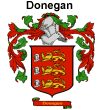
D: Donegan
H: Hamill
P: Preston
W: Wheeler, Whitty
View the Gallery here:
http://www.irishsurnames.com/coatsofarms/gm.htm
THE PERFECT WEDDING, ANNIVERSARY OR BIRTHDAY GIFT!
We now have over 100,000 worldwide names available.
Get the Coat of Arms Print, Claddagh Ring,
Screensaver, Watch, T-Shirt Transfer or Clock for
your name at:
https://www.irishnation.com/familycrestgifts.htm
YOU CAN HELP TO KEEP THIS FREE NEWSLETTER ALIVE!
Visit: https://www.irishnation.com
where you can get great Irish gifts, prints,
claddagh jewellery, engraved glassware and
much more.
Anne MacDonald of Massachusetts, USA ordered
a family crest plaque:
Hello, Michael,
Received my plaque, carefully wrapped,
in good order. It is splendid! I am
thrilled, and I know that my dad, for whose
81st birthday this was ordered, will love
it. I would like to order another one!
Everyone who has seen the plaque has been
really impressed, even those who, as my
daughter says are 'not into ancestor
worship!'Again, my hearty thanks for this
first-class product.
Sincerely, Anne MacDonald

THE PERFECT WEDDING OR ANNIVERSARY GIFT!
View family crest plaques and shields here:
https://www.irishnation.com/familycrestplaques.htm
======================
THE ROAD TO KNOWLEDGE
by John B. McCabe
======================
I can never recall with any accuracy my first day
at school because I made two beginnings. My
brother was two years older than me and he was
sent to school for the first time at the age of
six. I was sent along with him but then my
parents took pity on me because I was only four
and it was a mile walk to school. I was kept at
home until the following year and made a new
beginning then.
School itself was not such a wonderful experience
though I was bright enough to learn quickly and
was seldom punished. Being naturally fond of
company I delighted in the excitement of the
crowd but privately formed only a few special
friendships.
In spite of my ability to learn quickly it is
sad to recall that I never felt loved at
primary school and the prevailing mood of
those years was one of anxiety and nervousness
fear of being late, fear of being slapped,
shame at watching others being beaten.
The schoolmistress who taught me in the early
years was a good and conscientious young woman
who struggled heroically with too many children
clamoring for individual attention. The
schoolmaster was humane and philosophical and
I warmed to him a little better but never crossed
the bridge between servile respect and healthy
reverence where real learning is possible. There
was a hunger in me that was never filled in those
formative years. One or two small seeds did take
root where the cadence of words and rhythms from
early poems touched my ear for the first time but
it was a sparse and famished nourishment that
barely awoke the soul.
Scientists agree that the most difficult sense to
recall is the sense of smell. Even when we dream
we do so in visual and aural worlds but never in
olfactory dimensions. Yet when it comes to those
early school years it is a variety of smells and
tactile sensations which best evoke, for me, the
ambience and atmosphere of that time. The
distinctive smell and cloying touch of plasticine
finds me rolling out wriggly worms on a rough
bench to form bicycles, bird's nests, little
houses and a whole variety of clumsy models of
the world around me.
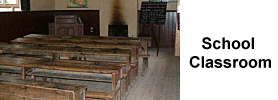
The fumbling grip of a tiny finger and thumb on
a morsel of chalk - the dry scratching on slate
announce my first wobbly alphabet. Cold water,
coal dust and sunlight soap in an enamelled
basin the ritual ablutions after lighting the
school fire. The aura of expectancy evoked in the
smell of new books and their promised discoveries,
marred inevitably by ink stains and sullied by
punishments earned or undeserved in the
explorations of grammar, spelling and
transcription. The musty aftermath of stale lunch
crumbs in canvas bags - the pungency of ammonia
fumes oozing from the dry-toilet walls. These and
a thousand other smells are forever remembrances
of school.
There was no wall-clock that I can recall and the
school day was measured as in some primeval age
by phases of change. Time did not seem to exist so
slowly did the hours drawl by. Morning prayers,
roll call, mid-morning break, the shock of sound
when the angelus rang from the nearby chapel,
lunch-time, afternoon break and finally the
excited exodus of home time. These were the
constant signposts along to road to knowledge.
Between these unchanging divisions of the day lay
the timeless routine of learning which followed a
monastic regularity: chanting of tables -
brow-furrowed puzzlement of sums - the finger
leading the eye from word to word along the
mysterious page.
There was so little colour in those books after
we left the infant classes that the mind grew
bland with boredom. My eyes hungered for some
stimulus to brighten the landscape of our drab
and desolate space. I still recall the primitive
abacus of coloured spools threaded on clothes-line
wire against the brown wainscoted wall - the vivid
pink of fresh plaster covering a hole in the
off-white ceiling - a deep green spray of painted
shamrocks and a cascade of fiery tongues lurking
among the dull pages of an early catechism.
Occasionally a little light would seep through a
chink in the armour of routine. A visiting
missionary would call with exotic tales of
malarious mosquitoes, witch doctors and cannibals
in dugout canoes. For a brief moment our minds
would glow in the warmth of imaginations fire,
bright as the equatorial sun. Rarer still a
travelling conjurer would visit and we could
purchase for a few pennies those happy mesmeric
moments when 'the swiftness of the hand would
steal a march on the eye'.
The most terrifyingly important moment of the year
was the annual catechism exam when we begged
mammy to 'put us over the answers' in the thin
dawn light before going in to school. The examiner
was a young priest, a gentle, warm and loving man
who offered half the answer with the question so
that we could act our answers from his prompting
phrases while we were centre-stage for this most
dramatic performance of the academic year.
Progress was measured by postings: firstly from
bench to bench and later from room to room. Moving
to the 'master's room' marked a definite
graduation which promised that sometime in the
unimaginable future it might be possible to earn
parole from this, to us, life-long learning
imprisonment.
Then there came a day shortly before I finished
my apprenticeship when the master opened a book
and read a poem in Irish called 'An Long' about
a ship which came to harbour after many exotic
adventures in far-away magical places. That's when
it happened. A door opened to a world of words.
Was it something in the timbre of emotion in the
master's voice or the look of longing in his tired
eyes when he savoured the sounds? I am sure he was
not aware of the impact he made on me at that
moment of epiphany but today I thank him for the
gift that was worth the waiting in those timeless
years.
John B. McCabe
====================
NINE FAMOUS IRISHMEN
by Roger Judge
====================
In the 'Young Ireland' disorders in Ireland in
1848 the following nine men were captured, tried,
and convicted of treason against Her Majesty,
the Queen, and were sentenced to death:
John Mitchell, Morris Lyene, Pat Donahue, Thomas
McGee, Charles Duff, Thomas Meagher, Richard
O'Gorman, Terrence McManus, Michael Ireland.
Before passing sentence, the judge asked if there
was anything that anyone wished to say. Meagher,
speaking for all, said:
'My Lord, this is our first offense but not our
last. If you will be easy with us this once, we
promise, on our word as gentlemen, to try to do
better next time. And next time we won't get
caught!'

The indignant judge sentenced them all to be
hanged by the neck until dead, and drawn and
quartered. Passionate protest from all the world
forced Queen Victoria to commute the sentence to
transportation for life to wild Australia.
In 1874, word reached the astounded Queen Victoria
that the Sir Charles Duffy who had been elected
Prime Minister of Australia was the same Charles
Duffy who had been transported 25 years before.
On the Queen's demand, the records of the rest of
the transported men were revealed and this is what
was uncovered:
Thomas Francis Meagher: Governor of Montana
Terrence McManus: Brigadier General, US Army,
Patrick Donahue: Brigadier General, US Army,
Richard O'Gorman: Governor General of Newfoundland
Morris Leyne: Attorney General of Australia,
after which Michael Ireland succeeded him.
Thomas D'Arcy McGee: Member off Parliament,
Montreal, Minister of Agriculture and President
of Council, Dominion of Canada
John Mitchell: prominent New York politician.
Roger Judge,
Newfoundland
KEEP THIS NEWSLETTER ALIVE!

Get Your Family Crest Signet Ring at:
https://www.irishnation.com
=================
GOLFING IN IRELAND
by Sean Downes
=================
If you are itching to hit the little white ball
around somewhere new this year, then take yourself
to the home of golf and leprechauns. Rolling green
hills, ocean views, and beautiful scenery are only
a plane ride away. Did I mention the fresh
Guinness? Ireland is easily accessible from most
major cities on the east coast of the US. Golf
packages can be put together for you by a
reputable travel agent. Golfing in Ireland is a
must for all avid golfers. If golf is one of your
passions, go to Ireland and play the best courses
in the world while experiencing beautiful scenery
and an amazing culture.
Ireland's golf courses are consistently ranked
among the top courses in the world year after
year. Courses such as Old Head, Lahinch, Connemara,
to name a few, have all won the course of the year
award within the last decade. Golf courses in
Ireland are traditional courses or Links courses.
These courses are known for their wide open
fairways and those tough, almost impossible to hit
out of, pot hole bunkers. While playing a round,
you have your choice of a motorized buggy or a
caddie to carry your clubs. Be sure to bring plenty
of balls with you because the rough next to the
fairways is sometimes two feet deep. Most courses
have very fast greens due to the strong winds that
blow off the ocean. If a challenge is what you're
after and you love playing the best the Ireland
is for you.
When your round of golf is over, you will have the
ability to see the most beautiful landscape a
country has to offer. Why not take a walk down by
the ocean. Go hiking up a mountain to a 16th
century castle. Or look for a rainbow and find the
pot of gold that is waiting for you. Ireland has
so many different activities for the young and the
old. You can go to the mountain country and go
horseback riding through the fields down to the
beach. Or try your luck at salmon fishing in the
west. A golf trip to Ireland let's one experience
one of the most unique, rugged and absolutely
beautiful places on earth.

My personal favorite part of an Ireland golf trip
is interacting with the people of this great
country and experiencing all of its great
traditions. The first thing you realize about
Ireland is that most everything revolves around
public houses or pubs. People meet in pubs to
discuss everything from business deals to recipes.
The pub is the heart of most small towns. If you
want to hear some of the latest gossip, go to the
pub. If you are interested in hearing some of the
best musicians anywhere, go to the pub. By the
way, did I mention the Guinness? The Irish are
great story tellers and after a few pints, will
gladly sing you a song or two. Religion in Ireland
is very important as well and touring through some
of the old churches is a must. Experiencing
Ireland's traditions alone makes for a great
vacation and will keep you coming back for more.
Golfing in Ireland is truly a must for all
aficionados of the game. Magnificent courses are
located throughout this golfer's paradise. Ireland
was rated the number one golf destination five of
the last seven years. Experiencing the vast
topography of this country is a trip of a lifetime
in itself. Spending an afternoon in the village pub
talking to the natives is priceless, not only for
their wit and charm but for the pub's libations as
well. After experiencing all of the wonderful
things this country has to offer it its easy to
see why it is the premier golf vacation
destination in the world.
Sean Downes
=============================
FROM AN IRISH MARKET TOWN
by Joe Rogers
=============================
My earliest memory is of 1936 and a nurse and her
large black bag coming to that house where shortly
afterwards the cries of a newborn baby heralded
the arrival of my sister, Philomena. She was a
summertime baby and the weather must have been
good that year because we had many long walks,
Billy and I holding on to Philomena's pram as it
was proudly pushed by our mother, who would stop
every now and then to show off her new baby to
neighbours and townsfolk we'd meet along the way,
some out walking themselves or going to the shops
or passing on bikes or with ponies & traps or
others with donkeys & carts. Not many motors then
very few and far between you'd hear them
before you'd see them, although as we lived next
door to the Malt House, invariably a long queue
of horses & carts with the odd motor lorry or
tractor in between them waiting their turn to
enter the Malt House to be unloaded of their
sacks of wheat and barley occupied much of the
narrow road and darkened the light in our kitchen
window. Not that we were in the least annoyed with
or inconvenienced by them. People were neighbourly
then and always had time for a friendly chat or a
smile or a kind word. When not out walking, we
played on the road and footpaths, conscious of
what little traffic there was at that time but
always in awe of the huge horses coming to or
going from the Malt House.
On the other side of the road, directly opposite
to our house in Coote Street, was a lay-by in
which County Council workmen kept supplies of
stone chippings they used for road repairs and
filling in pot holes. Occasionally they also
parked their steam-roller there, on which Billy
and I had hours of fun building airfields on
unpronounceable Pacific Islands and piloted in
planes that spit-in-the-fire to burn the
Japanese Zeros out of the sky. And when we had
cleaned up the Pacific we steam-rolled across
Europe flattening Luftwaffe Messerschmitts and
came head to head with Rommel in the desert.
Blinded by a sandstorm we wished ourselves
back home and there we were returning from one
of our walks which had included the harvesting
of crab apples from trees that grew wild at the
side of the Mountmellick Road about 2 miles from
Portlaoighise to discover that Michael and
Peter who had remained at home had busied
themselves in our absence by mixing porridge
oats, cocoa and milk to manufacture their own
contrived concoction of chocolate biscuits.
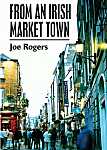
Read all of Chapter 1 in the online edition here:
https://www.ireland-information.com/jun11.htm#story
www.amazon.com in either paper back or kindle edition.
Also at Barnes & Noble or www.amazon.co.uk or from any bookshop.
KEEP THIS NEWSLETTER ALIVE! Visit https://www.irishnation.com
=======================================
GRACE O'MALLEY - GAELIC WARRIOR PRINCESS
=======================================
Ireland's contribution to female heroines includes
the 16th-century Grainne Ni Mhaille who was known
as the 'Queen of the Irish Seas'.
She was called Mhaol (meaning 'cropped hair'),
but was called Grace O'Malley by the English.
Born in the Province of Connaught, Grainne
married and had three children before she
commenced her famous career on the high seas,
marshaling three pirate ships and up to 200 men
as she opposed the English attempts to remove her.
Her husband was an O'Flaherty who was executed by
Queen Elizabeth's colonists who attempted to
completely subjugate the Irish way of life. In
1556 she married again, this time to Iron Richard
Burke and had a son named Tibbot. Captured
and jailed for two years she returned to her
homeland in Connaught to continue her defiance.
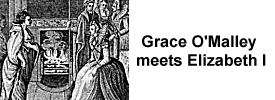
In 1558 Elizabeth I pardoned her in an attempt to
bring peace to the region but this attempt failed
as the local English administrators continued to
goad the woman who had been a thorn in their side
for years. They even interned her son and brother
despite Elizabeth I instructing that they be
released.
Fighting was her only means of survival and this
she did until the Irish defeat at the Battle of
Kinsale in 1601 checked her dominance. She died in
1603 and has since been, to a large degree,
overlooked as a genuine heroine of Irish history.
===========================
GAELIC PHRASES OF THE MONTH
===========================
PHRASE: eistigi liom!
PRONOUNCED: eish-tig-ee lum
MEANING: listen to me!
PHRASE: Dun do bheal!
PRONOUNCED: shut your mouth!
MEANING: duin duh vale!
PHRASE: gabh mo leithsceal!
PRONOUNCED: guh muh lesh/kale
MEANING: pardon me!
View the archive of phrases here:
https://www.ireland-information.com/irishphrases.htm
==================
COMPETITION RESULT
==================
The winner was: jmitchell@ameritech.net
who will receive the following:
A Single Family Crest Print (decorative)
(US$19.99 value)

Send us an email to claim your print, and well done!
Remember that all subscribers to this
newsletter are automatically entered into the
competition every time.
I hope that you have enjoyed this issue.
Until next month,

Michael Green,
Editor,
The Information about Ireland Site.
https://www.ireland-information.com
Click here to contact us

